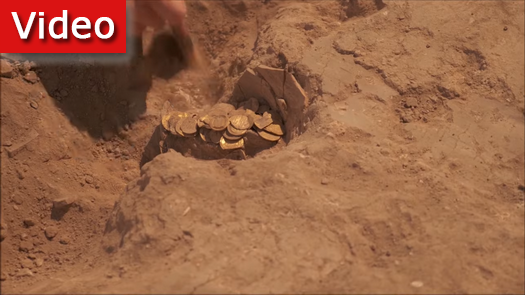
Hoard of Ancient Gold Coins Unearthed in Central Israel
An impressive and rare coin hoard from the Abbasid period, dating around 1,100 years ago, was uncovered by youth volunteering before their army service, in an archeological excavation carried out by the Israel Antiquities Authority, during the construction of a neighborhood in the center of the country.
Pre-army service “Shnat Sherut” youth participate regularly during the summer holidays in excavations as part of the Israel’s Antiquities Authority’s policy to bringing them closer to their past. Last Tuesday, two of these youth, of the “Cultural Movement” in Holon, suddenly noted something shimmering in the ground while working at the excavation.
According to Oz Cohen, one of the youth, “It was amazing. I dug in the ground and when I excavated the soil, saw what looked like very thin leaves. When I looked again I saw these were gold coins. It was really exciting to find such a special and ancient treasure.”
According to the directors of the excavation, Liat Nadav-Ziv and Dr. Elie Haddad of the Israel Antiquities Authority, “The hoard, deliberately buried in the ground in a clay jar, contained 425 gold coins, most of which date to the Abbasid period. The person who buried this treasure 1,100 years ago must have expected to retrieve it, and even secured the vessel with a nail so that it would not move. We can only guess what prevented him from returning to collect this treasure. Finding gold coins, certainly in such a considerable quantity, is extremely rare. We almost never find them in archeological excavations, given that gold has always been extremely valuable, melted down and reused from generation to generation. The coins made of pure gold that does not oxidize in air, were found in excellent condition, as if buried the day before. Their finding may indicate that international trade took place between the area’s residents and remote areas.”
Dr. Robert Kool, a coin expert at the Israel Antiquities Authority, explained: “It is extremely rare to find treasures from the Abbasid period in excavations in Israel – especially gold coins. This is one of the earliest known caches from this period (end of the 9th century) found in the country. The coins are made of pure gold – 24 carats. The total weight of the hoard is about 845 grams of pure gold – a significant amount of money in those days. For example, with such a sum, a person could buy a luxurious house in one of the best neighborhoods in Fustat, the enormous wealthy capital of Egypt in those days. From an initial examination of the coins, most of them date to the end of the 9th century CE. During this period, the region was part of the vast Abbasid Caliphate, stretching from Persia in the east to North Africa in the west, and whose center of government was in Baghdad, Iraq. The hoard consists of full gold dinars, but also – what is unusual – contains about 270 small gold cuttings – pieces of gold dinars cut to serve as ‘small change.”
The cutting of gold and silver coins was a regular feature of the monetary system in Islamic countries after the 850s, with the sudden disappearance of bronze and copper coins.
One of the cuttings is an exceptional rare piece, never found in excavations in Israel: a fragment of a gold solidus of the Byzantine emperor Theophilos (829 – 842 CE), minted in empire’s capital of Constantinople. The appearance of this small byzantine coin fragment in an Islamic coin hoard is rare material evidence of the continuous connections (war, trade) between the two rival empires during this period.
According to Dr. Kool, “this rare treasure will certainly be a major contribution to research, as finds from the Abbasid period in Israel are relatively few. Hopefully the study of the hoard will tell us more about a period of which we still know very little”.









